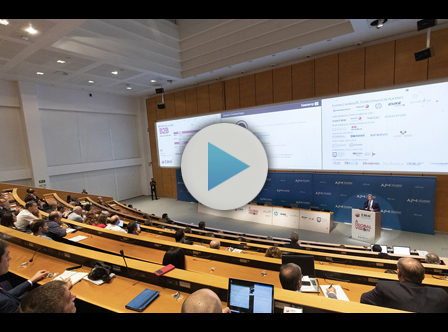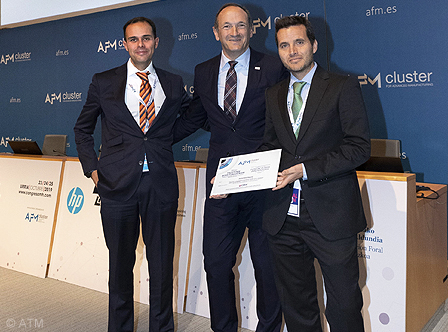NEWS
The technology centre had a significant presence at the 22nd edition of this conference held in in Donostia-San Sebastian from October 23 - 25.
IK4-TEKNIKER had a significant presence at the 22nd edition of Conference on Advanced Manufacturing and Machine Tools organised by AFM, Advanced Manufacturing Technologies, held from October 23 - 25 at the Gipuzkoa Science & Technology Park in Donostia-San Sebastián.
IK4-TEKNIKER, actively involved in the conference, gave five outstanding presentations as researchers from the technology centre addressed new developments and a number of issues related to “Digitising Advanced Manufacturing” and “Additive Manufacturing and Aerotrends”, two of the conference’s main topics.
Javier Arzamendi, the IK4-TEKNIKER deputy director for technology and member of the conference’s scientific and technical committee for the last 17 years, did not only attend this year’s edition but also chair a session on October 24 addressing “Machine tools and their components”.
This conference, officially opened by the president of the Basque Government Mr, Iñigo Urkullu, featured educational and scientific-technical sections geared towards specialists offer a forum in which IK4-TEKNIKER experts participated.
High productivity laser micro perforating machines
One of the most attractive lectures was entitled “Designing a high productive laser micro perforating machine for the aeronautical sector” that presented the development of Hyperdrill, a machine based on laser technology and used to manufacture large micro perforated panels fitted on aircraft tail stabilisers. This machine, jointly developed with the German technology centre Bremer Institut Fur Angewandte Strahltechnik (BIAS) and Aernnova, has been designed to process titanium panels measuring up to 5000 x 2000 x 0.8 mm in size at speed ratings in excess of 300 drillings/sec. It is to be validated and tested in an industrial environment. The machine will favour the production of HLFC (Hybrid Laminar Flow Control) structures. Consequently, it will allow aircraft fuel consumption to be reduced by up to 10%. This presentation was delivered on October 24 in the section on “Additive Manufacturing and Aerotrends” and received the award presented to “the most innovative lecture given by a company”.
Additive manufacturing
IK4-TEKNIKER gave two lectures on additive manufacturing. The first presentation entitled “Thermal control and monitoring performed by a laser camera to perform the LMD manufacturing technique”, took place on October 23 during the “Digitising Manufacturing” session. The paper described how to use an infrared thermal camera on the surface of parts produced during an LMD process.
This is highly relevant work because, in order to achieve the right degree of stability and homogeneity required to manufacture 3D components by layers (LMD), it is crucial to compensate any potential instabilities that may appear by adapting process parameters.
The second presentation entitled “A comparative study of the Laser Metal Deposition process using coaxial powder and thread in the production of Ti-6Al-4V structures”, compared coaxial powder and thread deposition processes from the point of view of microstructural quality, geometrics, deposition rates and efficiency to manufacture the same type of titanium structure for the aeronautical sector. This lecture was given on October 24 during the session on “Advanced Manufacturing and Aerotrends”.
Precision systems
Another two papers gave on October 23 describing precision systems. The paper entitled “Integrating and automating volumetric compensation and verification processes for machine tools” presented an integrated and automatic volumetric verification concept for machine tools that overcomes constraints imposed by current procedures because the solution uses only one measuring system.
The last lecture entitled “Compensation system for thermal errors on horizontal lathes” described the end results of work aimed at increasing lathe positioning accuracy thanks to more accurate manufacturing means and processes that remain more stable over time. Another aim of this project is to further upgrade machine features.





